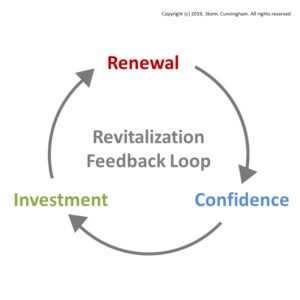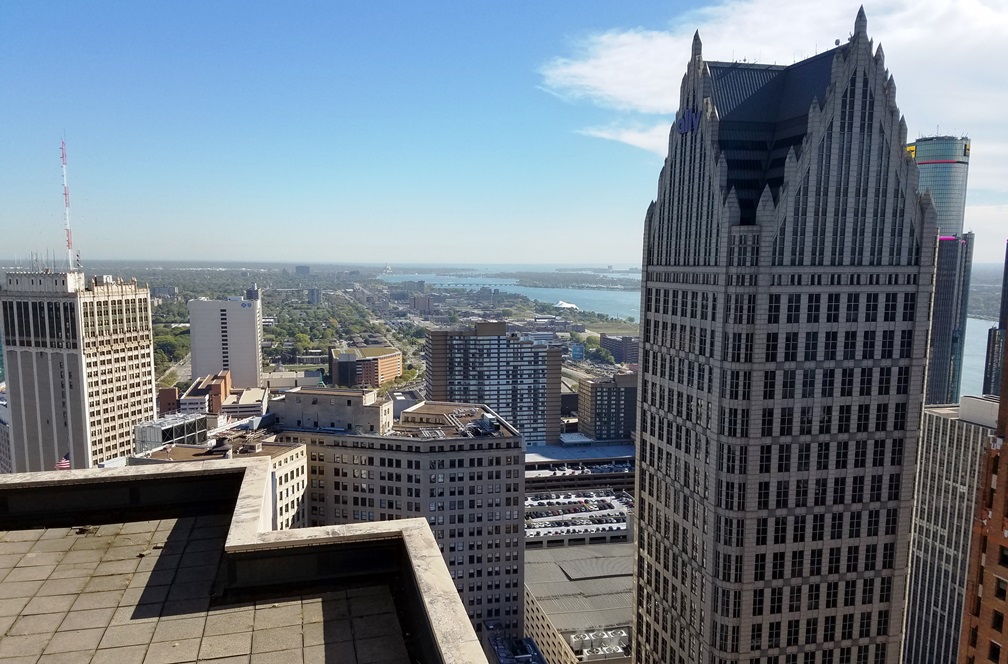As documented in the new (2020) book, RECONOMICS: The Path To Resilient Prosperity, boosting confidence in the local future is a universal goal of all community revitalization programs.
With that, communities can attract—and retain—residents, employers and real estate investors. They also have more ability to borrow money for capital improvement projects. Increasing such confidence is also the prime objective of most professional revitalization and resilience facilitators (those folks with the “RE” after their name).
 We saw that dynamic at work recently, when the recently-bankrupt City of Detroit successfully sold $80 million in bonds to support several revitalizing capital projects including: improvements to over 25 city parks; Phase 1 of the Joe Louis Greenway; fire house, police precinct and recreation center repairs; improvements to the Charles H. Wright Museum of African American History and the Detroit Historical Museum; construction of an expanded animal control facility and other City capital improvements.
We saw that dynamic at work recently, when the recently-bankrupt City of Detroit successfully sold $80 million in bonds to support several revitalizing capital projects including: improvements to over 25 city parks; Phase 1 of the Joe Louis Greenway; fire house, police precinct and recreation center repairs; improvements to the Charles H. Wright Museum of African American History and the Detroit Historical Museum; construction of an expanded animal control facility and other City capital improvements.
How much confidence do investors have in Detroit’s future? The sale of the bonds was nearly 10 times over-subscribed (or about $780 million in investor orders for $80 million in bonds) allowing the City to secure an all-in 4.64% interest rate! About 30 institutional investors placed orders on the bonds on October 15, 2020, many of which were repeat investors that purchased the City’s 2018 bonds, thus demonstrating their continued support of—and interest in—the city.
“With these bond proceeds, we will invest in our neighborhoods with renovations to parks, recreation centers, fire houses, police precincts and the start of the Joe Louis Greenway. The partnership with Council has enabled six straight balanced budgets which makes these investments possible,” said Mayor Mike Duggan, who led the city through this entire confidence-rebuilding process after a string of inept and/or corrupt previous mayors who helped drive Detroit into bankruptcy on July 18, 2013.
The demand for Detroit’s bonds reflects continued confidence in Detroit’s future which in no small part is due to the Mayor and City Council’s quick action to find savings and enact a balanced budget in the face of the COVID-19 revenue shortfalls. In maintaining the City’s credit rating in October, Moody’s wrote, “The positive outlook reflects the City’s early and significant response to projected revenue declines.”
“Today’s bond sale shows the continued confidence investors have in the City’s future. This confidence is due in no small part to good work of City Council and Mayor to ensure that the City provides first-class services to its residents while planning to meet its long-term obligations,” said Chief Financial Officer David Massaron.
These bonds will make possible the first construction investment in the Joe Louis Greenway, with the City aiming to finish Phase I in Fiscal Year 2022. The City’s bonds will leverage philanthropic investment as well as state and federal grants. In addition to investments in city museums, parks and recreation facilities, these bonds will invest about $40 million in public safety infrastructure such as fire and EMS vehicles, an expanded animal control building, and improvements to fire houses and police precincts.
In 2018, City Council authorized the sale of $255 million in bonds over multiple series to support recreation, public safety, transportation, and economic development capital investments, and this sale marks the second series of that authorization.
With funding from these bonds, the City has been able to reinvest in its capital infrastructure after decades of disinvestment. Detroit residents have enjoyed 155 parks that have been renovated with City bonds and other funds since 2015, a vast change from 2013 when only 26 City parks were actively maintained.
For the second time in more than 20 years, Detroit sold municipal bonds backed solely on the City’s ability to repay. Prior to 2018, the City could sell only bonds that were either backed by the state of Michigan or with insurance to the bondholder, which greatly added to the cost for the City.
Photo of Detroit by Storm Cunningham.

